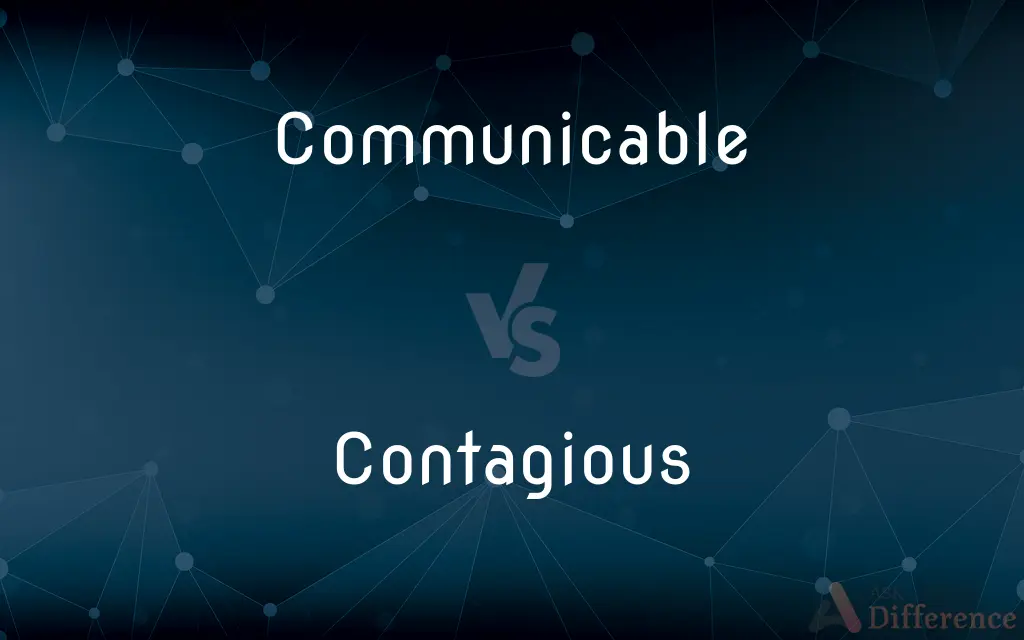Communicable vs. Contagious — What's the Difference?
By Urooj Arif & Fiza Rafique — Updated on April 18, 2024
Communicable diseases can spread through various means like contact, air, or water, whereas contagious diseases are specifically spread through direct or close contact.

Difference Between Communicable and Contagious
Table of Contents
ADVERTISEMENT
Key Differences
Communicable diseases encompass a broad range of infections that can spread through multiple channels including air, water, or physical contact. Examples include influenza, tuberculosis, and hepatitis. Whereas contagious diseases refer to those infections that are spread primarily through direct or close contact with an infected individual, such as the common cold or measles. This distinction highlights how the spread mechanisms influence preventive measures and public health policies.
Communicable diseases may also spread via vectors like mosquitoes or through contaminated food and water, impacting a wide demographic regardless of direct human contact. On the other hand, contagious diseases often require closer interaction for transmission, such as sharing personal space or touching the same objects, which influences the strategies for containment and isolation during outbreaks.
Preventive strategies for communicable diseases often include a wide array of measures such as sanitation, vaccination, and vector control. Whereas, for contagious diseases, prevention focuses more on avoiding close contact, maintaining hygiene, and quarantine measures. This reflects the different approaches required to control diseases based on their transmission methods.
The public health response to communicable diseases might include community-wide actions like water treatment and waste management to cut off transmission routes. On the other hand, contagious diseases might see responses like school closures or mask mandates to prevent person-to-person spread.
Understanding whether a disease is communicable or contagious affects medical advice and public guidance. For communicable diseases, broader societal and environmental interventions are crucial, while for contagious diseases, personal behavior and immediate environment sanitization play key roles.
ADVERTISEMENT
Comparison Chart
Definition
Diseases that can spread through various means including contact, air, or water.
Diseases specifically spread through direct or close contact.
Transmission Modes
Airborne particles, waterborne organisms, physical contact, vectors like mosquitoes.
Direct physical contact, droplets from coughs or sneezes, touching infected surfaces.
Examples
Tuberculosis, hepatitis, cholera.
Measles, chickenpox, common cold.
Preventive Measures
Vaccination, sanitation, vector control.
Quarantine, isolation, personal hygiene.
Impact on Public Health Policies
Broad actions like water treatment, waste management.
Specific actions like mask mandates, school closures.
Compare with Definitions
Communicable
Able to be transmitted from one person or organism to another.
Tuberculosis is a communicable disease that can spread through airborne particles.
Contagious
Primarily transmitted through direct physical interaction.
Impetigo is a contagious skin infection.
Communicable
Infectious diseases broad in transmission scope.
Malaria, a communicable disease, spreads through mosquito bites.
Contagious
Rapid spread in densely populated settings.
Contagious diseases thrive in conditions where people are in close quarters.
Communicable
Requiring comprehensive public health interventions.
Effective handling of communicable diseases often involves community-wide sanitation efforts.
Contagious
Involves managing person-to-person contact.
Contagious diseases like the common cold require good personal hygiene to manage.
Communicable
Not limited to direct contact for transmission.
Communicable diseases can spread even without direct human interactions.
Contagious
Necessitating strict isolation measures to prevent spread.
Patients with measles, a highly contagious disease, are often isolated.
Communicable
Spreadable through various environmental and contact modes.
Hepatitis A is communicable through contaminated food and water.
Contagious
Easily spread from person to person through close contact.
The flu is highly contagious and spreads via droplets.
Communicable
Transmittable between persons or species; contagious
Communicable diseases.
Contagious
Of or relating to contagion.
Communicable
Readily communicated
Communicable ideas.
Contagious
Transmissible by direct or indirect contact; communicable
A contagious disease.
Communicable
Talkative.
Contagious
Capable of transmitting a disease
Stayed at home until he was no longer contagious.
Communicable
Able to be transmitted between people or animals.
Contagious
Spreading or tending to spread from one to another; infectious
A contagious smile.
Communicable
Readily communicated.
Contagious
(of a disease) Easily transmitted to others.
Last year's flu strain was so contagious that everybody in town got sick!
Communicable
Talkative or expansive.
Contagious
(figurative) Easily passed on to others.
Contagious enthusiasm; infectious laughter
Wearing jeans was a contagious fad at that time.
Communicable
Capable of being communicated, or imparted; as, a communicable disease; communicable knowledge.
Contagious
(of a person) Having a disease that can be transmitted to another person.
They were highly contagious, spreading bacteria to other people.
Communicable
Communicative; free-speaking.
Contagious
Communicable by contact, by a virus, or by a bodily exhalation; catching; as, a contagious disease.
Communicable
(of disease) capable of being transmitted by infection
Contagious
Conveying or generating disease; pestilential; poisonous; as, contagious air.
Communicable
Readily communicated;
Communicable ideas
Contagious
Spreading or communicable from one to another; exciting similar emotions or conduct in others.
His genius rendered his courage more contagious.
The spirit of imitation is contagious.
Contagious
Of or relating to communicable diseases;
By the road to the contagious hospital
Contagious
Easily diffused or spread as from one person to another;
A contagious grin
Contagious
(of disease) capable of being transmitted by infection
Common Curiosities
Can communicable diseases be non-contagious?
Yes, some communicable diseases can be non-contagious if they require a specific non-human vector for transmission, such as malaria transmitted by mosquitoes.
How are communicable diseases controlled?
Control strategies for communicable diseases include vaccination, improving sanitation, vector control, and public health education.
Can a contagious disease be asymptomatic?
Yes, individuals can transmit contagious diseases even if they do not show symptoms, which complicates efforts to control spread.
What are the main preventive measures for contagious diseases?
Main preventive measures include isolation of infected individuals, wearing masks, maintaining personal hygiene, and minimizing close contact.
What role does hygiene play in controlling communicable and contagious diseases?
Hygiene plays a critical role in controlling both types of diseases, though it is especially pivotal in preventing the spread of contagious diseases through direct contact.
How are schools affected by outbreaks of contagious diseases?
Schools can be breeding grounds for contagious diseases due to close contact among students; closures and online classes are common responses during outbreaks.
What defines a disease as contagious?
A contagious disease is defined by its capacity to be transmitted through direct contact with an infected person, their bodily fluids, or surfaces they have touched.
What is a communicable disease?
A communicable disease is an illness that can be transmitted from one individual or species to another, through various means such as air, water, or direct contact.
How do public responses differ between communicable and contagious diseases?
Public responses to communicable diseases often involve broad environmental health measures, whereas responses to contagious diseases focus more on personal and direct community interventions.
Are all contagious diseases also communicable?
Yes, all contagious diseases are communicable as they involve the transmission of a disease agent; however, not all communicable diseases are contagious, depending on their means of spread.
How does quarantine help in controlling contagious diseases?
Quarantine helps by keeping those who are infected or at high risk of infection away from others, to prevent the disease from spreading through close contact.
What impact does water sanitation have on communicable diseases?
Proper water sanitation helps prevent diseases that are transmitted through contaminated water, such as cholera and typhoid.
How do health advisories differ between communicable and contagious diseases?
Health advisories for communicable diseases may focus on general health and safety practices, while those for contagious diseases are more likely to emphasize avoiding close contact and practicing good hygiene.
Why is vaccination important for communicable diseases?
Vaccination helps build immunity within the population, preventing the spread of diseases that can be transmitted through various vectors.
What is the difference in impact on global travel between communicable and contagious diseases?
Communicable diseases may lead to broader travel advisories and health checks, whereas contagious diseases might result in more targeted restrictions and quarantine measures for travelers.
Share Your Discovery

Previous Comparison
Saw vs. Speech
Next Comparison
Brief vs. ShortAuthor Spotlight
Written by
Urooj ArifUrooj is a skilled content writer at Ask Difference, known for her exceptional ability to simplify complex topics into engaging and informative content. With a passion for research and a flair for clear, concise writing, she consistently delivers articles that resonate with our diverse audience.
Co-written by
Fiza RafiqueFiza Rafique is a skilled content writer at AskDifference.com, where she meticulously refines and enhances written pieces. Drawing from her vast editorial expertise, Fiza ensures clarity, accuracy, and precision in every article. Passionate about language, she continually seeks to elevate the quality of content for readers worldwide.














































